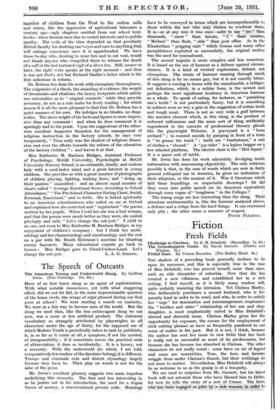The Speech of Outcasts
The American Tramp and Underworld Slang. By Godfrey Irwin. (Eric Partridge. 10a. 6d.) MOST of us first knew slang as an agent of sophistication, With what notable insouciance, yet with what staggering effect, did we not let fall, in the more impressionable quarters of the home circle, the scraps of argot gleaned during our first term at school ! We were stealing a march on maturity. We were in a fair way to become men of the world. But the slang we used then, like the less extravagant slang we use liow, was a more or less artificial product. The elaborate irocabulary so strangely attributed by playwrights to all Characters under the age of thirty, for the supposed use of which Modern Youth is periodically taken to task by publicists, is, in so far as it exists at all, a symptom, if not the symbol, of irresponsibility ; if it sometimes serves the practical ends of abbreviation, it does so incidentally. It is a luxury, not a necessity. With the underworld (to which, I am told, comparatively few readers of the Spectator belong), it is different. Tramps and criminals coin and distort etymology largely because they have to. Their play on words is not for the sake of the game.
Mr. Irwin's excellent glossary suggests two main impulses underlying this necessity. The first and less interesting is, as he points out in his introduction, the need for a lingua franca of secrecy, a conversational private code: • Meanings have to be conveyed in terms which are incomprehensible to those within the law who may chance to overhear them.
It is—or at any rate it was once—safer to say " ice" than
diamonds, " snow " than heroin, " C " than cocaine, " Michael " than flask, " obie " than post office. As in the Elizabethan " prigging cant " which Greene and many other pamphleteers exploited so successfully, the original motive was the need for concealment.
The second impulse is more complex, and less conscious. It is based on the use of humour as a defence against circum- stances. It is a kind of twisted euphemism, defiant, not obsequious. The strain of humour running through much of this slang is by no means gay, but it is not exactly bitter. It suggests a coming to terms with the unendurable, a belliger- ent defeatism, which, in a milder form, is the newest and perhaps the most significant tendency in American humour as a whole. To speak of eating, for instance, as " punishing one's teeth " is not particularly funny, but it is something to achieve even so wry a grin in the suggestion of rotten teeth and tough meat. There is not so very wide a gulf between the macabre element which, in this slang, is the product of enforced callousness and the same sort of thing artificially engendered in the conceits of professional literary ghouls like the playwright Webster. A graveyard is a " bone orchard " ; to commit suicide by jumping in front of a train is " to grease the track " ; teeth are " tombstones," a suit of clothes a "shroud." A " joy-rider " is a legless beggar on a low wheeled platform. The electric chair is the " Hot Squat." It is a queer sort of mirth.
Mr. Irwin has done his work admirably, divulging inside information with unassuming objectivity. The only criticism possible is that, in the case of words which are now in fairly general colloquial use in America, he gives no indication of their adoption, or the manner of it Was it literature which laid these foundlings on respectable doorsteps ? Or did they come into polite speech (or its American equivalent) through some vogue of " toughness " in the Colleges ?
The tramp songs are less interesting than the slang. Their atrocious sentimentality is, like the humour analysed above; a defence and a refuge from the hard things. It can command only pity ; the other earns a measure of respect.
PETER FLEMING.










































 Previous page
Previous page